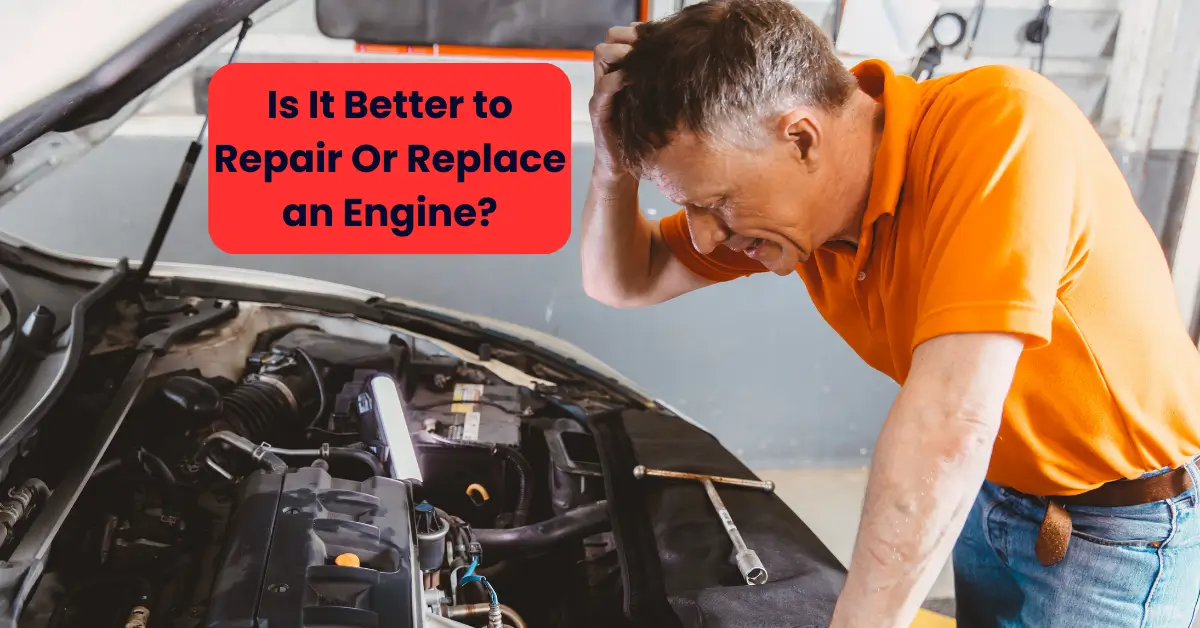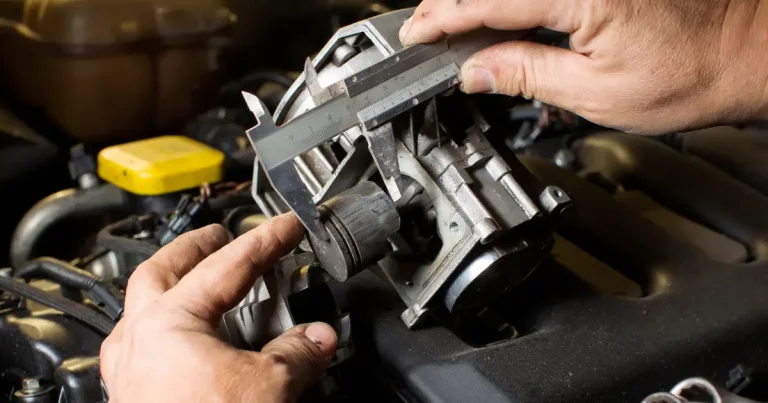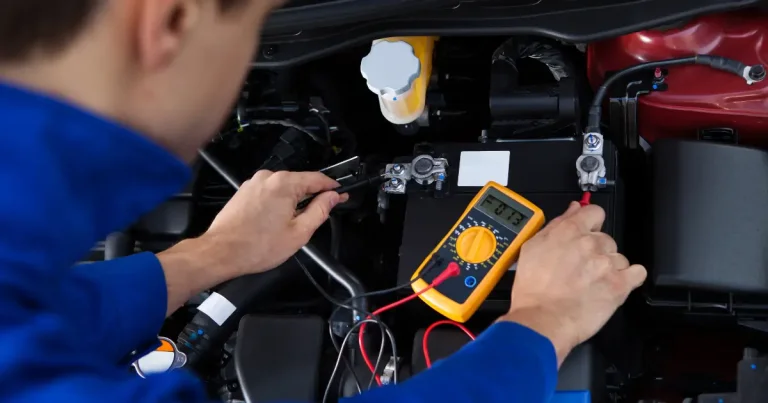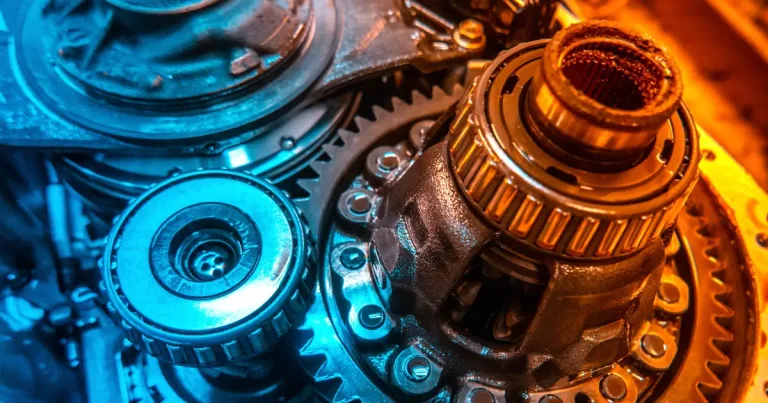Deciding to repair or replace an engine often depends on cost and the age of the car. Replacement is typically preferred with extensive damage or high-mileage vehicles.
Is It Better to Repair Or Replace an Engine?
Determining whether to repair or replace a car’s engine is a critical decision for any vehicle owner. It can hinge on several factors, including the vehicle’s overall condition, the cost-effectiveness of repair versus replacement, and the expected lifespan of the vehicle after the service.
Opting for a repair might be more economical if the engine has minor issues and the car is relatively new with lower mileage. On the other hand, a replacement engine could be a smarter investment for an older model where a repair may only temporarily extend its life. This introductory consideration sets the stage for drivers to weigh the pros and cons of each option, to maximize their vehicle’s performance and value.
Assessing Engine Damage
When the heart of your car begins to falter, you face the dreaded decision: repair or replace? Assessing engine damage requires a careful approach. Understanding the extent of damage is crucial in making an informed decision for your vehicle’s engine. Let’s dive into the signs and professional evaluation techniques that will guide you through this process.
Identifying The Signs Of Engine Failure
Is your car’s engine on its last legs? Here’s what you should look for:
- Loud knocks: If your engine bangs or knocks, it’s waving a red flag.
- Smoke signals: Blue or grey exhaust smoke is a tell-tale sign of oil burning.
- Power loss: Does your car struggle uphill? It’s a symptom of engine wear.
- Pesky leaks: Puddles under your car can suggest internal trouble.
- Warning lights: Pay attention to your dashboard; those lights can save your engine.
Professional Evaluation And Diagnosis
Don’t guess the health of your engine. Seek a professional’s opinion. Here’s why:
- Detailed Analysis: Certified mechanics use advanced diagnostic tools to gauge engine health.
- Expert Insight: With years of experience, professionals spot issues you might miss.
- Cost Estimates: You’ll get an accurate repair vs. replacement cost comparison.
- Warranty Check: Mechanics will determine if existing warranties cover potential repairs.
Takeaway: Decode engine troubles with a mechanic’s expertise. It guides you toward the best action.
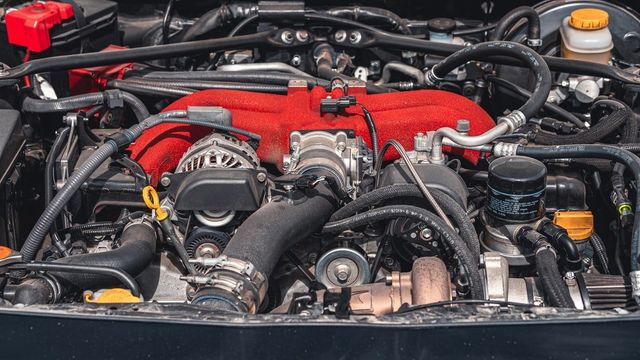
Credit: www.postonmotorcompany.com
Cost Implications
Deciding whether to repair or replace your engine is a big decision. It has huge cost implications. Let’s break down these costs. This will help you make an informed choice.
Calculating Repair Costs
Sometimes, engines need small fixes. Other times, the fixes are big. It’s key to understand repair costs. Here are steps to calculate:
- Diagnosis: A mechanic finds the issue. Sometimes this is free. Other times it costs money.
- Parts: Engines have many parts. Some are cheap. Some are expensive.
- Labor: Fixing engines takes time. Mechanics charge for this time. More time means more money.
- Miscellaneous: Other costs may pop up. Always consider this.
Comparing Replacement Expenses
It’s time to think about replacing your engine. This option might be pricey. Let’s compare:
| Type of Replacement | Cost Range |
|---|---|
| Rebuilt Engine | $2,500 – $4,000 |
| Remanufactured Engine | $3,000 – $7,000 |
| Used Engine | $1,000 – $3,000 |
| New Engine | $4,000 – $10,000 |
Think about the engine type. Rebuilt or remanufactured? Maybe a used or new one? Each has its own cost. Consider the engine’s lifespan. Also, think about the warranty offered. This can save money in the long run.
Impact On Vehicle Value
The Impact on Vehicle Value is a critical factor to consider when deciding between engine repair and replacement.
Vehicle owners often face the tough decision of repairing or replacing their car’s engine. The choice can significantly influence the vehicle’s overall value.
Influence Of Engine Repair On Resale
Engine repairs vary from minor fixes to major overhauls. The extent and quality of repairs can either maintain or decrease the car’s value.
- Minor repairs can maintain vehicle value if done promptly.
- Major repairs can affect value since buyers may worry about future issues.
Documented maintenance history after a repair can help retain the car’s resale value.
Effect Of Engine Replacement On Market Value
Replacing an engine presents a significant investment in your vehicle. This can lead to a boost in market value, especially if using a new or remanufactured engine.
| Engine Condition | Value Impact |
|---|---|
| New Engine | Increases value; like-new condition |
| Remanufactured Engine | Similar to new; positive value impact |
| Used Engine | Varies; less value increase than new |
Ensure that the engine replacement is well-documented to maximize the potential increase in market value.
Considering The Age And Condition Of The Vehicle
Considering the Age and Condition of the Vehicle is crucial when deciding whether to repair or replace an engine. The current state and future reliability of your car often determine the most cost-effective and sensible path forward.
Vehicle Lifespans Prospects
Understanding your vehicle’s potential lifespan is key. Assess the vehicle’s overall health beyond just the engine. Consider the following:
- Mileage: Low mileage may indicate many years of service left.
- Maintenance history: A well-maintained car often lasts longer.
- Model reliability: Some makes are known for their longevity.
A relatively new car with a faulty engine might be worth the investment of a repair or replacement. On the other hand, an older car nearing the end of its run might not be.
Wear And Tear Considerations
Wear and tear factors heavily into this decision. Here’s what to weigh:
| Component | Condition | Impact on Decision |
|---|---|---|
| Transmission | Good | Repair engine |
| Brakes | Worn | Consider replacement |
| Suspension | Good | Repair engine |
Scrutinize each critical part. Costly wear might tip the scales towards getting a new car. Additionally, think about parts compatibility if you opt for a replacement engine.
The Role Of Warranties And Guarantees
Deciding between repairing or replacing an engine is complex. Warranties and guarantees play a crucial role in this decision. They offer protection against defects and can save you money. Understand your coverage to make an informed choice.
Navigating Warranty Coverage
Navigating Warranty Coverage
Manufacturer warranties cover repairs and replacements. These typically last for a set period or mileage. Check your documents for terms and conditions. Pay attention to coverage expiry dates and servicing rules.
Extended warranties bought from dealers or independent providers may offer additional coverage. Confirm what’s included. Look for engine-related issues and study the process for claims.
Aftermarket Parts and Warranty Implications
Aftermarket Parts And Warranty Implications
Using aftermarket parts can affect warranties. Manufacturer policies vary. Some may void coverage if non-original parts cause damage.
- Always verify with your warranty provider before using aftermarket parts.
- Keep receipts for replaced parts and services.
- Consult with certified mechanics to preserve warranty integrity.
Downtime And Inconvenience
Deciding between repairing or replacing an engine is tough. Think about time without your car. Quick fixes are tempting. But are they best? Let’s look closer.
Assessing Repair Time
Engine repair ranges in complexity. Simple fixes might take a day. Major work could stretch over weeks. Consider:
- Workshop schedule – Busier shops mean longer waits.
- Parts availability – Rarer parts lead to delays.
- Engine condition – Worse condition equals longer job.
Evaluating Replacement Turnaround
Replacing an engine might seem faster. Yet, it’s not just plug-and-play. Account for:
- Engine sourcing – Finding a new or used match takes time.
- Compatibility check – Ensuring the new engine fits is crucial.
- Installation – Skilled labor is required.
In both scenarios, assess downtime against urgency. Need your car back ASAP? Inform your mechanic. Your choice impacts your routine. Choose wisely!
Environmental Factors
The choice between repairing or replacing an engine involves more than just cost and time. Environmental factors play a crucial role in making a sustainable decision. As we explore the impact of engine repair versus replacement, it’s important to consider the eco-friendly option.
Environmental Considerations Of Repairs
Repairing an engine can often be the more environmentally conscious choice. Before opting for a replacement, consider these points:
- Reduced Waste: Repairs may limit the number of parts discarded.
- Conservation of Resources: Less new material is needed when fixing an existing engine.
- Lower Carbon Footprint: Less manufacturing and transportation means fewer emissions.
Local repair shops can also offer the benefit of shorter travel distances for parts and services, further minimizing environmental impact.
Eco-impact Of Engine Replacement
Replacing an engine, although sometimes necessary, has a different set of environmental implications:
| Eco-Impact Factor | Description |
|---|---|
| Manufacturing Strain: | New engines require energy-intensive production processes. |
| Resource Depletion: | Extraction of raw materials can deplete natural resources. |
| Increased Emissions: | Shipping new engines contributes to greenhouse gas emissions. |
It is essential to weigh both options with the planet in mind. Sometimes, an engine replacement embodies the progress towards cleaner technology like hybrid or electric engines. This transition can result in long-term environmental benefits.
Long-term Reliability And Performance
When your car engine starts giving you trouble, two paths daunt you: repair or replace. Both options concern the long-term reliability and performance of your vehicle. It’s essential to consider what each choice means for your car’s future. Let’s delve into how repairing or replacing an engine can influence its endurance and longevity.
Repairing For Endurance
Opting to repair your engine can be a cost-effective solution. It’s about fixing the problem at hand to keep the engine running. Repairs aim to restore the engine’s current state and address immediate failures. Regular maintenance and timely repairs enhance an engine’s endurance.
- Cost-effective in the short term
- Targets specific issues
- Potentially extends current engine life
- Requires skilled mechanics for complex issues
However, consider the age and condition of the engine. Chronic issues may lead to repeated visitations to the mechanic. In some cases, repairing may not be the most reliable long-term solution.
Replacing For Longevity
Replacing an engine is a major investment. It involves getting a new or remanufactured engine. This option can significantly enhance performance and increase reliability, much like a new lease on life for your vehicle. Replacing an engine promises to extend the vehicle’s lifespan and maintain its value.
| Benefits | Considerations |
|---|---|
| Improved reliability | High upfront cost |
| Boosts vehicle lifespan | Possible compatibility issues |
| Increase in performance | Warranty on new engines |
Engine replacement is ideal for vehicles with a solid body and interior. It won’t be economical if the rest of the vehicle is on the brink of failure. Consider this option for a vehicle with a good track record that requires a new engine to ensure long-term viability.
Making The Decision: Repair Or Replace?
Car troubles can throw us for a loop, especially when faced with the engine dilemma. The engine, the heartbeat of any vehicle, may leave you at a crossroads: should you repair the damage or replace the entire engine? Navigating this decision requires thorough evaluation of benefits and drawbacks, alongside your own needs and circumstances.
Weighing Pro’s And Con’s
Understanding the advantages and disadvantages is crucial. Let’s break down these factors to provide a clearer picture.
| Pro’s | Con’s |
|---|---|
|
|
Personal Circumstances And Final Choices
Your unique situation plays a major role. Consider these points:
- Budget: Evaluate your funds. Is the repair cost reasonable or is a new engine the smarter financial move?
- Vehicle Value: Assess the worth of your car. Does investing in a new engine make sense?
- Goals: Think long-term. Are you planning to keep the car for many years or selling it soon?
Balancing these considerations will lead to a wise choice. Titling the scales in favor of what suits your needs best is the ultimate goal. Whether you opt for repair or replacement, ensure the decision benefits your situation now and in the future.

Credit: www.linkedin.com
Real-life Examples And Case Studies
Welcome to our deep dive into engine dilemmas! People often ponder the decision to repair or replace a car engine. Real stories reveal the best choice. Let’s look at real examples and see what worked!
Success Stories Of Engine Repair
Imagine John’s 2010 Honda Accord. The engine started making noise. Many would consider saying goodbye. But John chose repair. A skilled mechanic fixed the issue, replacing worn-out parts. The total cost? Only a fraction of getting a new engine or car. John’s Accord still runs smoothly, hitting 200,000 miles with ease.
Amy’s story is similar. Her Toyota Camry suffered from overheating. The culprit was a faulty head gasket. Amy opted for repair. The result was a Camry that continued to purr like a kitten, saving Amy a bundle of cash.
Stories like these highlight engine repair’s benefits:
- Lower costs compared to complete replacements
- Extended vehicle life without a hefty investment
- Sustainability by avoiding unnecessary waste
Engine Replacement Wins
Now, meet Bob. Bob drove a vintage Mustang. Repair wasn’t practical due to extensive damage. He opted for replacement. A modern, efficient engine was installed. Bob’s Mustang roared back to life, more powerful than ever.
Linda faced a similar decision with her SUV. High repair costs and an uncertain future outcome led to her choice to replace. Post-replacement, her SUV’s reliability and performance skyrocketed.
When replacement outshines repair:
- Modern technology boosts leads to better fuel economy and power
- Long-term reliability means peace of mind on the road
- Warranty coverage on new engines assures future savings
Seeking Professional Advice
Struggling with engine trouble can be a daunting experience. When faced with the dilemma of repairing or replacing your vehicle’s engine, seeking the right professional advice is crucial. This guidance can make the decision-making process smoother and more cost-effective. Let’s delve into the importance of consulting with a mechanic and the wisdom of getting a second opinion.
Consulting A Mechanic
Expert mechanics offer invaluable insights into the health of your engine. They perform detailed diagnostics to identify issues. A thorough assessment includes checking engine components and function. Mechanics weigh repair costs against engine replacement options. They consider factors like vehicle age, mileage, and current value. This analysis helps determine the most sensible course of action.
Getting A Second Opinion
Seeking a second opinion is always a smart move. It ensures the initial diagnosis and advice is accurate. Different mechanics might offer alternate solutions or cost estimates. This step can lead to more informed decisions and potentially save you money. Comparing opinions also reveals the consensus on your engine’s condition.
- Compare diagnostic results
- Assess varying repair strategies
- Review multiple cost estimates
Preparing For The Future
Deciding between repairing or replacing an engine is a significant decision. Preparing for the future can help mitigate this daunting situation. A well-maintained vehicle ensures better longevity and performance.
Maintenance Tips To Avoid Future Issues
Regular maintenance is key to engine health. Here’s a quick guide to keep your engine in top condition:
- Change the oil every 3,000 to 5,000 miles to ensure lubrication.
- Replace air filters to prevent dirt from entering the engine.
- Maintain coolant levels to avoid overheating.
- Inspect spark plugs for consistent ignition.
Understanding Your Vehicle’s Needs
Each vehicle has unique needs based on its model, age, and mileage. Stay informed on your car’s specifics:
| Model Year | Expected Mileage | Maintenance Checkpoints |
|---|---|---|
| Pre-2000 | Up to 150,000 miles | Timing belts, hose inspections |
| 2000-2010 | Up to 200,000 miles | Transmission fluid, fuel system cleaning |
| 2010-Present | Up to 250,000 miles | Battery health, tyre tread check |
Always refer to the owner’s manual. Use the right fuel grade and keep an eye on dashboard warning lights.
Credit: www.dubizzle.com
Conclusion
Deciding between engine repair or replacement hinges on cost-efficiency and long-term vehicle health. Assess your car’s value, repair scope, and future reliability. Consult with trusted mechanics to make an informed choice. Prioritize your safety and financial well-being to steer this critical automotive decision.
Drive on with confidence, knowing you’ve made the smartest investment for your transport needs.

